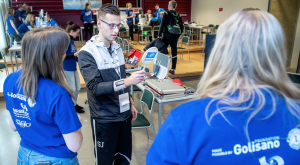Join a powerful, unprecedented alliance for better eye health for all.
Join IAPB-
Choose an alternate language here
On this World Optometry Day 2021, I want to call out the importance of ensuring that all people have access to quality eye care. I have spent the last 25 years of my professional life focusing on the visual needs of persons with intellectual disabilities (ID). My work with the Special Olympics Lions Clubs International Opening Eyes Vision program grew from my friendship with Dr. Paul Berman (volunteer, American Optometric Association). It was his plea to advocate for a population that is visually underserved, has documented higher prevalence of vision and eye health problems, typically does not have the same access to spectacles as those without ID and rarely advocate for themselves. It was felt that many eye care providers didn’t feel comfortable working with people with ID since the exam was more challenging and time-consuming.
The Opening Eyes program

Optometry opened the door in 1995 with a programme to assess the vision of people with ID. By 1999, eye care providers that covered a quarter of the world’s population were engaged in the Opening Eyes program This expansion meant that all types of eye care providers were now collaborating to deliver quality eyecare. The engagement of these providers who have donated time and expertise helped to expand the message of the importance providing eye care to people with ID but there is a long way to go. We need to ensure that all academic programmes prepare their clinicians to serve the visual needs of all patients in their practices, including people with ID, ensuring that they receive high quality, equitable, and affordable care.